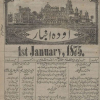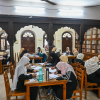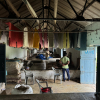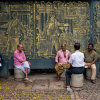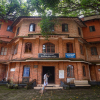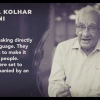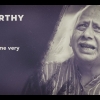In this interview, he presents a representative opinion of the Korlai villagers about their language, why they think it is necessary to preserve it and their worries about the increasing influence of other languages due to TV and mobile phones. It provides a new perspective regarding the values that the native speakers ascribe to their own language and their views about its cultural vis-a-vis economic importance.
Following is an edited transcript of the interview conducted originally in Marathi, at Korlai on January 8, 2018.
Neha Desai (ND): What do you know about Korlai Creole?
Ignatius Pereira (IP): We think this language is Portuguese, not anything else. Everyone calls it Portuguese here. I have heard that it is known as a creole language, but for us it is Portuguese. From when I remember, everyone around me, especially the elders, have been talking in this Portuguese only. The language has been evolving according to the changing culture around it.
ND: When did you realise that your language is special and that people might be interested in studying it?
IP: Only when people from outside started coming to Korlai, after the 1980s. A person from America, Clancy Clements, first started to spread information about this language. Only we villagers knew about the language; the world came to know about it only after outsiders came to the village. Before Clancy Clements came here, Jerome Rozario [a local, related to Korlai Catholic church] went to Portugal and tried to spread knowledge about the language. But we were not aware of any difference in our language nor were we especially curious about why people were taking interest in this language. For us, ours was just another language.
ND: Did you at any point feel that this language could be a hindrance to better career and education opportunities?
IP: Of course! As no one from outside this tiny village speaks this language, kids here face problems in their education and careers. Primary schooling is in Marathi but we do not speak Marathi in our homes. So, the kids take longer to get familiarised with the words and struggle to understand the lessons, but only for the first one or two years. Earlier, people also left school after the second or third standard because of this disconnect, and joined their parents in agriculture. But things have changed now with the kids taking an interest in learning; there are lesser number of dropouts.
Earlier, many of the teachers in the village schools were outsiders. They did not know the language [Korlai Creole] and there were communication gaps, which also affected the learning of these kids in the first two or three years of their education. There are local teachers now and the sisters [nuns in missionary schools] from the school also know the language, so the problem has reduced to some extent. Kids now can also understand and speak Marathi very well.
ND: Do you think the focus on Marathi to earn a living harms the future of the Korlai Creole?
IP: Certainly! I cannot be certain of the future of this language. Marathi schooling and, most importantly, TV is the culprit. My children’s generation got educated and moved out of Korlai; they had to converse in Marathi. If the parents do not speak proper Portuguese at home, how can we expect their children to? My grandparents spoke proper, fluent Portuguese. I use many Marathi words, so my grandkids will naturally use them. Also, many of those who went out fell in love and married people who spoke English, Konkani or Marathi, which also impacted the usage of Portuguese in homes.
ND: In such a scenario, do you think it is necessary to take special steps to preserve this language?
IP: Yes, it should be preserved. The father [church reverend] tried to convince people in this regard and introduced a course in Portuguese language. Jerome Rozario’s daughter also is trying to preserve this language. People from outside Korlai came here and enrolled in the course, but students of the village are not taking an interest. They are interested in completing their schooling and moving away for better careers. They think that this language is restricted to Korlai only. What we need is a teacher who speaks pure Portuguese and is ready to live in Korlai to teach the kids here. And the government cannot do much about it; we have to do it. The highly educated youth of this village who go out in search of jobs must take the responsibility.
ND: There are many such dialects of Marathi, like Malvani and Ahirani, which are not used professionally. People speak these languages in private conversations only. But they are nowhere near extinction. Why your language then?
IP: These dialects have Marathi words mixed in them, and a person from another region can understand them. That is not the case with Korlai Creole. The vocabulary is Portuguese; people from outside cannot understand the vocabulary.
ND: So, what do you think will happen if the language becomes extinct?
IP: Who has seen the future? But I do not think it will matter much. Only the language will be no more, nothing else will change. One must change with time. Our culture, apart from the language, is similar to that of other Portuguese Christian communities. All the rituals and festivals will remain the same but the Latin songs are becoming few. During the processions of St. Sebastian and Mt. Mary, there are some Latin songs that are sung. Even now, some younger people come with us and sing in the procession. It is up to them to keep the tradition going. We have written the songs down and they read out the songs. They do not understand the meaning. Since 1963–64, the Mass has also been in Marathi, which has helped cater to a larger number of people. The same will happen with the songs as well.
ND: If the culture or tradition will not change, why should the language be preserved and taught to future generations?
IP: Children are anyway learning in schools, are not they? If they are to go abroad to, say, Portugal or anywhere that Portuguese is spoken, learning the language will help them earn more and get better jobs. Even some companies require people who speak Portuguese.
ND: That is a completely new perspective that you have given me. When we talk about the language, we usually think of cultural importance and the need to preserve the language to protect the culture. Do not you think that is important too?
IP: The culture of this village will remain the same. It will not end. Even if from tomorrow everybody starts speaking in Marathi, the culture will remain the same.
ND: Are there any problems that Korlai faces due to these language barriers?
IP: Not really. We can speak Marathi. And many Hindus can understand Portuguese—they cannot speak it but they understand it. So, there are no communication barriers.
Many Hindus live near the fort [of Korlai, which was the centre of Portuguese settlement in the village], so close to us. But they still cannot speak this language because it is only acquired by close contact with the community. They did not have the avenues to learn Portuguese; we learnt Marathi from school. That is why there has to be at least a course teaching Portuguese in the local schools here.
ND: Are there any examples of Marathi’s impact on the language?
IP: Yes! A lot of words have been adopted from Marathi. And the influence of English is increasing too, especially with TV and mobiles.
Interestingly, Marathi is spoken with a Portuguese accent [by the Korlai natives who speak Marathi with the non-natives and even in professional capacities] but not the other way around. Some words have changed too. Instead of saying ‘use fals’, meaning ‘you spoke’, we now say ‘va halo’ [to express the same]. I do not know if this is because of Marathi or not but it is certainly a changed version of the original language.
English had not had any such major impact on our language but because of mobiles now, it has started influencing. Nobody speaks proper Portuguese now.
ND: Is there any communication gap between generations because of the language?
IP: No, no! The kids here know the language very well—they just cannot speak it fluently enough; there might be some words in older stories, difficult words, which they cannot understand. There is a slight difference between the language of written stories and the spoken language. But that is the only gap; there are no differences within groups or occupations because of linguistic barriers.



